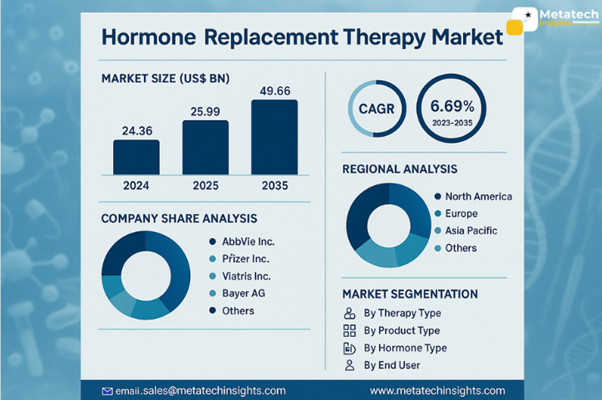Global Hormone Replacement Therapy Market to Hit USD 49.66 Bn by 2035 | CAGR 6.69%
24 Aug 2025 | Report ID: MI3383 | Industry: Healthcare | Pages: 210 | Forecast Year: 2025-2035

Read more about this report- Global Hormone Replacement Therapy Market to Hit USD 49.66 Bn by 2035 | CAGR 6.69%
- The Hormone Replacement Therapy Market is valued at USD 24.36 billion in 2024.
- The Hormone Replacement Therapy Market will achieve USD 49.66 billion by 2035 through a projected 6.69% CAGR from 2025 to 2035.
- The Hormone Replacement Therapy Market is poised to experience significant growth owing to the advancement in awareness levels about the disorders related to hormones, the expansion of the hormonal incongruity prevalence that comes along with the age-related menopause and vague age-aligned hormone imbalance, and the growing acceptance of customized restorative solutions. Much the same as the growth in the geriatric population, the development of new forms of therapy and the improvement of patient education are supporting market growth. Advances in the methods of delivery, enhanced safety records, and patient-suited processes are also contributing to increased case acceptance of HRT across the various demographics.
- The market can be divided based on therapy type, which includes estrogen therapy, progesterone therapy, combined therapy, and testosterone therapy. The market is monopolized by estrogen therapy because it is widely used in the treatment of post-surgical hormonal deficiency and menopausal insufficiency, among others. Combinations of therapies are growing in popularity due to the uniquely holistic symptom control they can provide, whereas the role of testosterone therapy is also gaining traction in the context of male hormonal insufficiency and age-related parameters.
- The market is segmented by product type, which includes oral tablets, transdermal patches, topical gels and creams, implants, and nasal sprays. Oral tablets still maintain a considerable market share because of convenience and established clinical use. Transdermal patches and topical preparations are on the increase due to their convenience and ease of application, controlled delivery of the hormone, and less systemic effect, which appeals to long-term treatment patients.
- The type segment of the hormones includes natural, synthetic, and bioidentical hormones. Natural and bioidentical hormones are used more and more often because they are better tolerated and more similar to natural hormones. The use of synthetic hormones is still common in low-price markets and in standardized therapeutic regimens.
- The market is also characterized in its end users by the hospitals and healthcare centers, the specialty clinics, and the individual patients who gain access to it through prescription-based home care. A significant share of consumption is provided by hospitals and clinics because of patient management programs, diagnostic support, and monitoring of hormones. The growing trend of patients preferring at-home therapy and the utilization of telehealth consultations is opening up access to care providers specialized in providing such care.
- Monetary growth is further catalyzed by growing spending on healthcare, higher disposable income, and growing healthcare infrastructure in both the advanced and developing worlds. Ongoing research, improvement of safer and specific formulations, and the usage of patient-friendly delivery mechanisms are some of the factors that are advancing market penetration. Creation of awareness concerning hormonal health and preventive therapy is also a major factor in determining uptake of therapy.
- Geographically, the market in question covers North America, Europe, Asia Pacific, Latin America, the Middle East, and Africa. North America has a stronghold presently owing to a high healthcare consciousness, a sophisticated healthcare system, and a high patient population. Asia Pacific will experience the fastest growth rate owing to the provision of more healthcare facilities, a rising female population, governmental and social programs in hormonal health, and urbanization.
- Some of the major companies influencing the hormone replacement therapy market are AbbVie Inc., Pfizer Inc., Viatris Inc., Bayer AG, etc. Strategic launch of products, innovation in bioidentical and safer hormone formulations, and broadening multi-channel distribution channels to enhance market presence and respond to the changing patient preferences are some key areas of focus by these companies.
Maximize your value and knowledge with our 5 Reports-in-1 Bundle - over 40% off!
Our analysts are ready to help you immediately.
